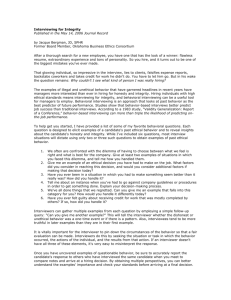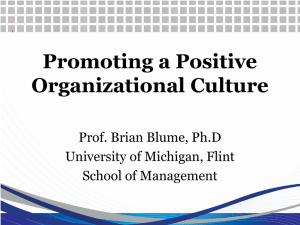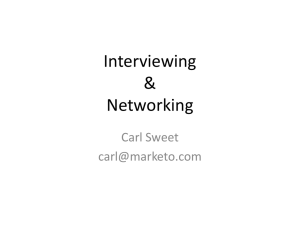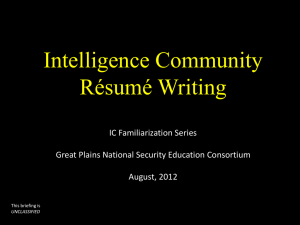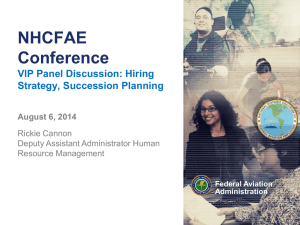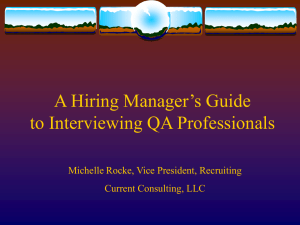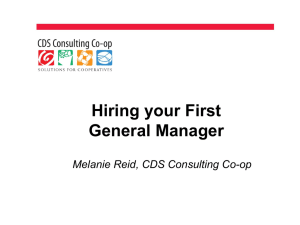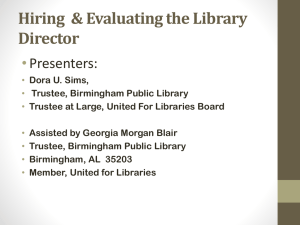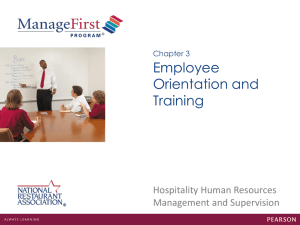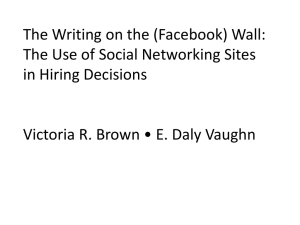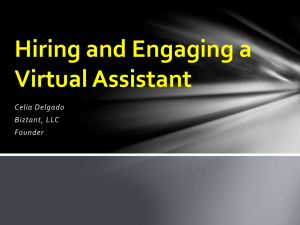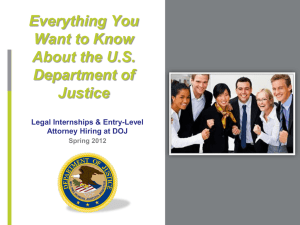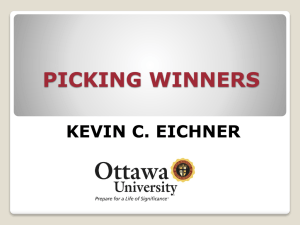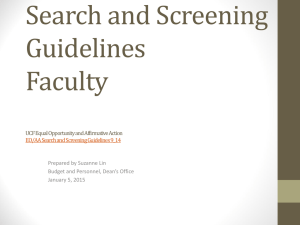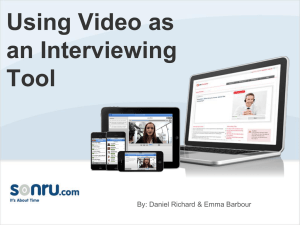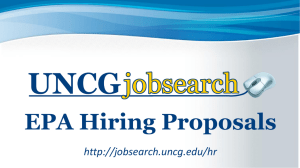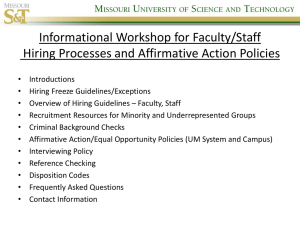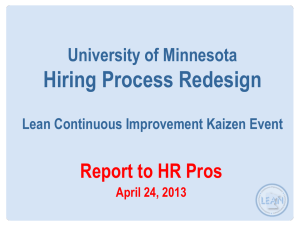Staffing and Human Resources Breakout with Erin Henderlight
advertisement
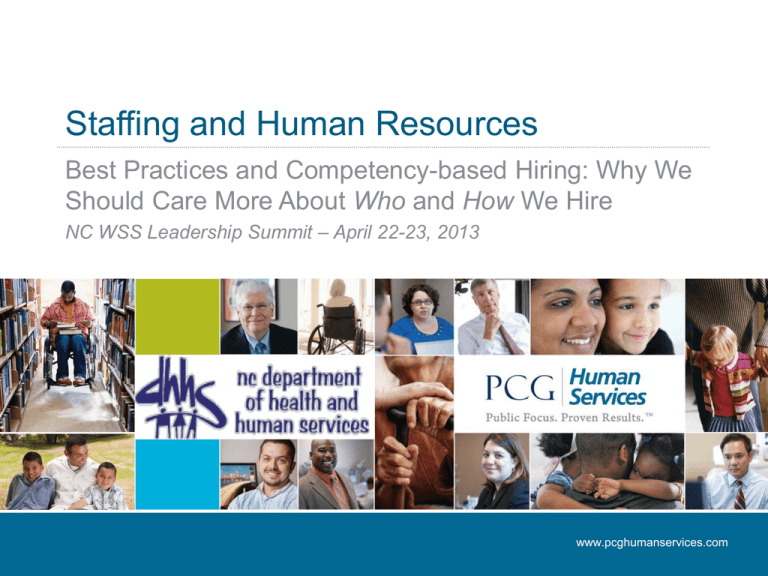
Staffing and Human Resources Best Practices and Competency-based Hiring: Why We Should Care More About Who and How We Hire NC WSS Leadership Summit – April 22-23, 2013 www.pcghumanservices.com Agenda • • • • • • • • Overview Cost of Turnover NC FAST and WSS Changes The Hiring Process Supervisors Training Other Considerations Questions 2 3 Cost of Turnover Employee Cost + Loss of Productivity of Other Staff + Cost To Hire + Training Costs + Days to Full Productivity Cost of Turnover: Income Maintenance Caseworker II = $30,0000 - $50,000 4 NC FAST and WSS Changes • Universal Workers • Reception • Triage • Task Management Redesigning Service Delivery • No Wrong Door 5 Starting with the End in Mind? State/Organization Activity APHSA • Changes to job descriptions/ classifications do not change the workers' jobs, just the way the work is done. • Once you have made changes to your business process, keep HR in the loop and ask them for input. You should be talking to HR! Florida • Job classifications have not changed; however, skill set needed for today's work environment and performance metrics have changed • Production/performance measures have changed as the workload has changed/increase, performance is measured by quantity and quality which are measurable via a data management system. Arizona • Task-based transition in 2010. Didn't change job positions/classifications because the work didn't change- just how it's organized. • Using a data dashboard to manage resources better. Hawaii • Transformation to task management did not change the duties and responsibilities of eligibility workers, supervisors and clerical. • Hawaii is not planning to make any changes in the future as well. • Changed training methodology as well as performance tracking 6 You Don’t Have to Wait ! 7 The Hiring Process Flow Notice of Vacancy Assessment of Agency Needs Communication with HR Posting Interview(s) Communication with HR Screening Communication with HR Discussion Communication with HR References and other follow-up Offer 8 The Hiring Process: Assessment Considerations • Where are our needs? • What are our opportunities to do things differently? • Where do we have flexibility? Opportunities • Non-traditional classifications • • • • • Flexibility in hiring The ability to segregate work elements where learning curve is shorter so get workers up-to-speed faster Contract workers OSP Allowances Community-base http://www.osp.state.nc.us/Guide/CompWebSite/Classification/classification.htm 9 Job Postings 10 The Hiring Process: Develop a Profile Think about your performer(s) when considering your next hire: • What skills are required for a candidate to be successful? • Is there a realistic job preview you can provide in the posting? • What prior experience has led a person to be successful in this role? • What constitutes a good personality fit in this position? • If someone was not successful, why? The Hiring Process: KSAs Behavioral • Trait belonging to a person • A quality characteristic • Teamwork • Culture Fit • Prioritization • Organization Skills • Handling Difficult Situations • Good Communication Skills Technical • Attained through education, training and repetition • The ability, coming from one's knowledge, practice, aptitude, etc., to do something well • NC FAST • Data Entry • Interviewing • Mathematics/Budgeting • Translation – Written/Verbal • Computer Maneuverability 12 The Hiring Process: Posting UNC SSW Jobs List: http://ssw.unc.edu/dssjobsnc/jobs_list North Carolina Association of County Commissioners Jobs County Webpage Colleges/Universities Local Community Organizations Free Job Posting Sites Twitter: #ncjobs 13 The Hiring Process: Screening 14 The Hiring Process: Screening 15 The Hiring Process: Interviewing & Selecting Behavioral Interviewing: Conduct behavioral based interview focused questions such as: leadership, attention to detail, stress management, customer focus, etc. Developing a Behavioral Interviewing Process - The steps to develop a behavioral interviewing process include: • Identifying which job competencies to focus on during interviews. • Developing and asking the right interview questions designed to provide as much information as possible about the interviewee’s experience in each competency by detailing a specific situation in the past where they exhibited a particular competency. • Each question should be designed to elicit three specific pieces of information: 1. A description of the situation. 2. The interviewee’s role, responsibility or action in the example. 3. The specific outcome of the situation. 16 Competency Teamwork Decision-Making Working Environment Handling Frustration Communication Stress Tolerance Question • What did you do in your last job to contribute toward a teamwork environment? • When working on a team, what role do you usually take? Why? • Can you tell us about a really difficult decision you had to make at work recently? • How have you handled a difficult situation with a co-worker? • Tell me about a time in which you could not finish a task because of lack of information. How did you handle it? • Relate a time in which you had to use your verbal communication skills in order to get an important point across. • Can you recall a particularly stressful situation you have had at work recently? What was your role in the situation? Did you do anything specific to deal with the stress 17 The Hiring Process: Interviewing & Selecting Technical Interviewing: Addressing specific, desired skill through interview focused questions and performance tests on subjects such as: computer skills, budgeting, conflict management, and data input. Developing a Technical Interviewing Process - The steps to develop a technical interviewing process are much like those for behavioral and include: • Identifying which job skills to focus on during interviews. • Asking the right interview questions and developing the right tests designed to provide as much information as possible about the interviewee’s abilities. 18 Supervisors Supervisor Leadworker IMC II 19 Qualities of a Good Supervisor 20 Training Considerations: A Step Process Changes Reviews Conversions Intake 21 Other Considerations • • • • • • • Professional Development Succession Planning Individual Performance Measures Coaching and Support Mentoring Enhance Subject Matter Expertise Recognition 22 Questions 23 Contact Sheet Erin Henderlight, WSS Project Manager ehenderlight@pcgus.com (828) 214-3614 24 Public Consulting Group, Inc. 148 State Street, Tenth Floor, Boston, Massachusetts 02109 (617) 426-2026, www.publicconsultinggroup.com 25

